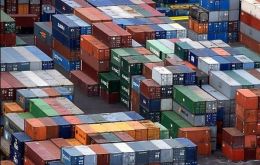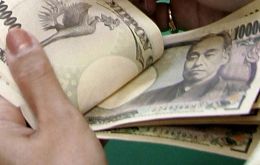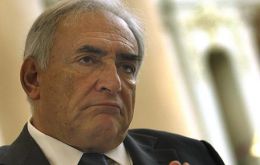MercoPress. South Atlantic News Agency
Economy
-
Saturday, February 27th 2010 - 08:07 UTC
Positive surprise from the UK economy in the fourth quarter

The United Kingdom economy grew at a greater rate than previously thought in the final three months of 2009, official figures have shown. The Office for National Statistics revised its figure for fourth quarter GDP to show 0.3% growth - up from its previous estimate of 0.1%.
-
Saturday, February 27th 2010 - 07:46 UTC
US economy signals swift pace of recovery; consumer confidence remains tepid

The US economy grew at an annualised rate of 5.9% in the last three months of 2009, revised official figures have shown. The rate is higher than the first estimate of 5.7%.
The figures confirm the world's largest economy is emerging rapidly from recession. -
Saturday, February 27th 2010 - 07:45 UTC
Jaguar and Land Rover under new owner India’s Tata turn a profit

Jaguar Land Rover turned in a profit of £55 million in the last three months of 2009 after a loss of £60 million in the previous quarter. The company's owner, India's Tata Motors, said the bounce back was thanks to stronger market conditions.
It added that its range of new models had helped its performance. -
Saturday, February 27th 2010 - 07:21 UTC
Greek/German row leads to claims of World War II compensations

Greek Deputy Prime Minister Theodoros Pangalos has accused Germany of failing to compensate Greece for Nazi occupation during World War II. Mr Pangalos made the remarks during a wide-ranging BBC interview about Greece's financial difficulties.
-
Saturday, February 27th 2010 - 07:17 UTC
IMF warns of asset bubbles in Brazil and Indonesia

International Monetary Fund, IMF, chief Dominique Strauss Khan warned that Brazil and Indonesia and other emerging countries are in “real risk” of suffering an assets price bubble given the inflow on foreign capital.
-
Saturday, February 27th 2010 - 00:49 UTC
US says China remains largest holder of Treasury securities

Japan did not surpass China to become the world’s largest foreign holder of US Treasury securities in December, reported the US Treasury Department on Friday following a revision to figures released earlier this month.
-
Saturday, February 27th 2010 - 00:47 UTC
IMF chief suggests “exploring” possible new international reserve currency

The head of the International Monetary Fund said it would be “intellectually healthy to explore” the possible creation of an international reserve currency that would serve as an alternative to the US dollar-.
-
Friday, February 26th 2010 - 16:55 UTC
China recommends US takes steps to promote confidence in the dollar

China defended its move to reduce its holdings of U.S. Treasury securities, saying the United States should take steps to promote confidence in U.S. dollar.
-
Friday, February 26th 2010 - 06:50 UTC
Falklands’ oil companies could be takeover targets, says financial report

United Kingdom oil and gas companies drilling near the Falklands Islands may become takeover targets this year, Deloitte & Touche LLP said in a report released Thursday in London.
-
Friday, February 26th 2010 - 06:30 UTC
Chile’s largest copper producer increases output: first time in five years

Chile’s Codelco, the world’s largest copper producer, increased production in 2009 for the first time in five years, helped by a new mine. The company also generated an impressive surplus over the last four years.
